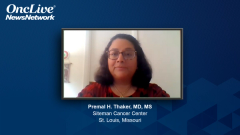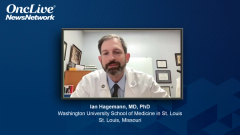
Making a Differential Diagnosis of Low-Grade Serous Ovarian Cancer
Expert oncologist Ian Hagemann, MD, PhD, shares insight into the process of making a differential diagnosis of low-grade serous ovarian cancer in light of adjacent disease and available IHC testing.
Episodes in this series

Summary:
Within the spectrum of ovarian tumors, notable players include fibromas, thecomas, and granulosa cell tumors, alongside germ cell tumors such as mature cystic teratomas, dysgerminomas, mixed germ cell tumors, and yolk sac tumors. Metastases to the ovaries are also plausible, particularly in patients with a cancer history, necessitating vigilance in differential diagnosis.
Serous tumors, classified into benign, borderline, and malignant based on clinical behavior, require careful evaluation beyond cell type determination. Low-grade serous cancer (LGSC) poses specific diagnostic challenges, often overlapping with serous borderline tumors. Pathological examination becomes pivotal, with micropapillary or cribriform features signaling potential aggressiveness and a resemblance to LGSC behavior. Micro-invasion, defined as foci less than five mm in size, is present in serous borderline tumors but doesn't classify as LGSC unless the morphology aligns with the latter. Lymph node involvement by serous borderline tumors is distinct, not considered metastatic. In the differential diagnosis, distinguishing low from high-grade serous carcinoma is crucial, as they represent distinct diseases with varying molecular profiles.
Molecular profiling emerges as an opportunity for LGSC patients, especially those with advanced-stage disease. Tumor profiling using next-generation sequencing often reveals KRAS or BRAF mutations, indicating oncogene activation, while lacking p53 loss of function mutations and homologous recombination deficiency. Molecular insights aid in confirming the LGSC diagnosis, identifying treatment targets, and preventing misclassification. Overall, meticulous pathology review, awareness of potential mimickers, and molecular profiling enhance diagnostic accuracy and guide treatment strategies in the complex landscape of ovarian tumors, specifically focusing on the nuanced aspects of low-grade serous carcinoma.
Summary is AI-generated and reviewed by OncLive editorial staff.










































